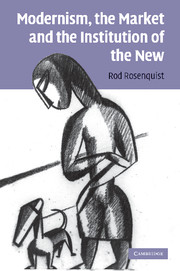Book contents
- Frontmatter
- Contents
- Acknowledgements
- List of abbreviations
- Introduction: The modernist latecomer and ‘permanent novelty’
- Chapter 1 ‘Changing the changing’: Wyndham Lewis and the new modernist ascendancy
- Chapter 2 Laura Riding, modernist fashion and the individual talent
- Chapter 3 The immolation of the artist: Henry Miller and the ‘hot-house geniuses’
- Chapter 4 Investing in the modernist legacy: Objectivist adventures in the ‘Pound tradition’
- Chapter 5 The last word: or how to bring modernism to an end
- Notes
- Index
Introduction: The modernist latecomer and ‘permanent novelty’
Published online by Cambridge University Press: 25 June 2009
- Frontmatter
- Contents
- Acknowledgements
- List of abbreviations
- Introduction: The modernist latecomer and ‘permanent novelty’
- Chapter 1 ‘Changing the changing’: Wyndham Lewis and the new modernist ascendancy
- Chapter 2 Laura Riding, modernist fashion and the individual talent
- Chapter 3 The immolation of the artist: Henry Miller and the ‘hot-house geniuses’
- Chapter 4 Investing in the modernist legacy: Objectivist adventures in the ‘Pound tradition’
- Chapter 5 The last word: or how to bring modernism to an end
- Notes
- Index
Summary
‘Literature is news that STAYS news.’
Ezra Pound, ABC of ReadingAt the end of 1922, Ezra Pound announced to Margaret Anderson, ‘Intelligent reviews of my last works, of Eliots Waste Land, and even of that olde classicke Ulysses wd. be suitable features for an up to date annual.’ While there is an evident employment of irony in the use of the word classic to describe these fairly recently published works, Pound's statement reveals a contemporary acknowledgement of a tension in early twentieth-century literature that critics of the twenty-first century still find perplexing. That a work of art could be considered simultaneously well established, even ‘classic’, as well as ‘modern’ or ‘up to date’ is perhaps a peculiar problem in studies of the movement we still call, nearly a century later, ‘modernism’. Those critics focusing on the period have done much to make this paradox a central element of the character of the movement, revealing the methods modernist authors used to make careers for themselves out of constantly reinventing the new, all the while consciously positioning their works within an older literary tradition. We cannot know, of course, whether Pound could foresee the future literary histories which would confirm 1922 as the annus mirabilis of modernism, as well as making Ulysses, The Waste Land (both 1922) and Pound's poems of this time into what we call, perhaps oxymoronically, ‘modernist classics’.
But the modernists themselves, of course, did have their own pronounced views on the relationship between the new and the classic works of art.
- Type
- Chapter
- Information
- Modernism, the Market and the Institution of the New , pp. 1 - 32Publisher: Cambridge University PressPrint publication year: 2009



